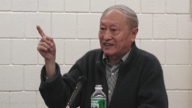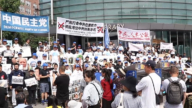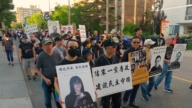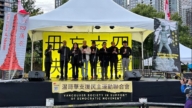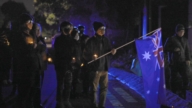【新唐人2012年9月13日讯】“英国广播公司BBC”10号报导,今年90岁的匈牙利前共产党领导人贝洛•比斯库,因为被控暴力镇压1956年匈牙利人民革命而遭逮捕。虽然这场“匈牙利革命”被认为和中国的“六四事件”有类似之处,但评论认为,中共领导层并没有从类似的事件中惊醒。
比斯库被控在战争期间没能保护平民,并下令保安部队开枪射杀51名民众。虽然比斯库否认这些指控,但是如果罪名成立,他可能面临终身监禁的惩罚。由于年老体衰,比斯库目前受到软禁。
1956年10月23号,匈牙利人民起义,反对苏联控制的匈牙利共产党专制政府。最初以和平的学生运动开始,但是苏联的坦克开进布达佩斯,苏军的血腥镇压一直持续到11月4号,至少3000名匈牙利平民被打死,20万人逃往西方国家。匈牙利首脑伊姆尔•纳吉宣布匈牙利退出华沙条约组织,而被苏联以反革命的罪名处以绞刑。
在这场被称为“匈牙利革命”的事件中,比斯库积极组织党员参与苏军镇压,之后他在苏联扶植的匈牙利傀儡政府中担任过内政部长。由于匈牙利今年年初修改法律,比斯库才得以被控罪。
北京律师江天勇介绍,民主国家对过去政府违法和不正义行为的弥补,被称为“转型正义”(Transitional Justice)。
北京律师江天勇:“像匈牙利这样的国家存在一个‘转型正义’的问题,不仅仅转型就完了,转型之后对过去曾经犯过的罪行肯定要有一个审判,否则的话它就没有公正。”
江天勇表示,虽然有些独裁政权的官员认为,只要没有直接杀人,就可以逃脱镇压民众的责任,但实际上不可能。
江天勇:“有些罪行它不能溯及既往,比如说简单的民事纠纷,简单的故意伤害,可能,但是涉及到反人类,这样一些人权迫害,一般来说,很难逃掉这种历史的惩罚。”
旅居德国的“民主阵线”主席费良勇撰文指出:“匈牙利事件的总体过程同中国的八九民运类似,不过,匈牙利惨案主要是外国军队造成的,六四大屠杀完全是本国军队制造的。”
那麽,匈牙利国家体制的转型是否可以作为中国的借鉴呢?
大陆媒体人黄良天指出,关键不在于政治体制,而是中国人的意识已经被党文化污染。
大陆媒体人黄良天:“你就是把台湾那一套搬到中国大陆来,也是一团糟。所以说,对人的意识的那种毒害,那根深蒂固。中国社会最可怕的症结就在这个地方,而不在于几个领导人、贪官。”
黄良天表示,从现状看,匈牙利、红色高棉的例子都没能让中共惊醒。
黄良天:“它现在已经形成了一种惯性,谁也煞不住。它如果没有一个非常大的外部环境,或者社会环境起来的话,你光靠这个党的本身,领导人的自我发现,或者他们的一种什么清官情结,很难扭转这么一个趋势——越来越走向专制。”
对于1956年的“匈牙利革命”,《新华社》办的《世界知识》期刊中,不提警方开枪打死上百人,因此引发群众怒火,却一直宣传匈牙利百姓激进;又指称革命是由于西方煽动;还淡化总理伊姆尔•纳吉最重要的举措——匈牙利要求中立,退出华约组织。
采访/白梅 编辑/尚燕 后制/葛雷
90-Year-Old Ex-Hungarian Communist Leader Arrested
On September 10, the BBC reported of Bela Biszku’s arrest.
Biszku, 90, was former Hungarian communist party leader.
He was accused of violent suppression on civilians
during the 1956 Hungarian Revolution.
The Uprising of 1956 was considered similar
to the June 4 Incident of 1989 in China.
Commentators say, the Chinese Communist Party (CCP)
top leaders have not yet learned from these real life lessons.
Biszku is accused of “failing to protect civilians in wartime,
and of responsibility for ordering security forces
to open fire on crowds," said the BBC news report.
Biszku “denies the charges, for which he could face a life
sentence." “Prosecutors want him put under house arrest."
On October 23, 1956, a mass uprising erupted in Hungary,
against the Soviet-backed communist regime.
The uprising began as a student demonstration.
Afterwards, the Soviet army tanks rolled into Budapest.
The bloody crush lasted until November 4. At least 3,000
Hungarian civilians were killed and 200,000 people fled to Western countries.
Hungarian’s then leader Imre Nagy announced
Hungary’s withdrawal from the Warsaw Pact.
Nagy was later executed (by hanging)
by the Soviets on charges of treason.
The BBC news reported that Biszku was “one of the key
designers and one of those responsible for the reprisals that followed the 1956 revolution and uprising".
Biszku later served as Interior Minister in the puppet regime
installed by the former Soviet Union.
Biszku was finally prosecuted for war crimes after
“the so-called Biszku Law was drawn up in 2011."
Beijing-based lawyer Jiang Tianyong introduced
the concept of “Transitional Justice."
It refers to approaches that states may use to address
past governments’violations of law and justice.
Jiang Tianyong: “Like Hungary, which now deals
with the issue of “transitional justice."
After the country’s political transformation,
it will definitely bring those past criminals to justice.
Otherwise, justice would not exist
anymore in this world."
Jiang Tianyong said this is a warning
to all those dictatorial regimes’officials.
Some of them thought they would escape liability
for repression only if they did not directly killed civilians.
Jiang Tianyong warns,
that would not be possible in real life.
Jiang Tianyong: “Some crimes cannot be retroactive. Such
as simple civil disputes, non-serious intentional assaults.
But when it comes to crimes against humanity, like human
rights violations, for the culprits in general was hard to escape punishment in history."
Fei Liangyong, chairman of Germany-based
Democratic China Front, wrote an article on the issue.
Fei said, “The Hungarian event was overall similar
to the 1989 pro-democracy movement in China.
The Hungarian tragedy was mainly work of foreign troops.
But the June 4th Massacre in China was completely done by the Chinese army,"the author points.
Can Hungarian’s political transformation
serve as a model for China?
China’s media professional, Huang Liangtian,
says the issue is not with the political establishment.
Rather, the problem is that Chinese people have been
brainwashed by the CCP’s culture for too long.
Huang Liangtian: “Even the current political system
in Taiwan cannot work in today’s mainland China.
Chinese people are now deeply ideologically poisoned.
That’s the most serious crux of nowadays Chinese society.
Corrupt officials in the ruling political system
is not the biggest concern now."
Huang said that cases like Hungary and Khmer Rouge,
have not yet awakened the CCP top leaders.
Huang Liangtian: “Now it (CCP’s regime) has formed
an inertia system which no one can stop.
If China can’t create a powerful social pressure, it’s too hard
to reverse the trend of CCP’s approach to dictatorship."
CCP’s Xinhua News Agency also commented
on the Hungarian Revolution of 1956.
The official media ignored the fact that the militia had
fired upon hundreds of people which outraged civilians.
It however threw the blame on the Hungarian people,
accusing them of being overflowed with radicalness.
The commentary alleged that the uprising
was incited by the Western Bloc.
Further, it down played the importance of Hungary’s
then Prime Minister Imre Nagy’s announcement – to seek neutrality by quitting the Warsaw Pact.


